An infant who became sick just minutes after a hepatitis B vaccination and died an hour later may be the fourth victim of vaccines produced by China’s largest hepatitis B vaccine supplier in the southern city of Shenzhen.
The deaths have triggered a nationwide suspension.
An official investigation is underway, while Biokangtai has not said where vaccines from the same batch as the Shenzhen baby received may have been sold.
Last Tuesday, the boy, born at 10:31am and apparently healthy, was given a vaccination six minutes later. At 10:39am, his face turned blue, his cries became faint and his breathing became rapid due to a lack of oxygen, Dr Yang Jinmin at the Nanwan People’s Hospital in Shenzhen, Guangdong Province, said.
China’s medical rules say an infant should receive a hepatitis B vaccine within 24 hours of birth.
An average of around 50,000 Chinese are born every day, according to official estimates, and most get the hepatitis B injection shortly after birth.
Biokangtai, established in August 1988, has a 60 percent share of the market and sales of 10 million vaccines a year in China, according to The Time Weekly.
The Shenzhen baby was pronounced dead after emergency treatment failed to revive him, yesterday’s New Express Daily said. “A doctor told me my son was born healthy. He had been crying for five to 10 minutes but stopped when he was injected,” the boy’s father said.
Yang said the hospital was in negotiations with the family over compensation. They had decided to apply for a medicolegal examination, the newspaper said.
The vaccine Yang’s son received was of a different batch from those blamed for the deaths of three other children in Hunan and Sichuan provinces over the past few weeks but all were produced by Biokangtai.
Zhang Shiying, an official of the Shenzhen Disease Control and Prevention Center, said the vaccine the Shenzhen baby received was from the batch bought on October 8. Nearly a third of 60,300 vaccines had been used and no one had been reported sick, Zhang added.
However, China’s health authorities have ordered hospitals to stop injecting babies with hepatitis B vaccines from Biokangtai.
The ban might cause a shortage, Zhang told the Guangzhou-based Nanfang Daily, but parents in the city could buy imported vaccines as a replacement before other domestic product arrived.
Guangzhou, the provincial capital, has stopped offering vaccinations though all 190 babies who had received vaccines are still healthy. When to resume the service hasn’t been decided, according to the New Express Daily.
Another 31,500 vaccines found in storage in Guangzhou have been sealed, said Wang Ming, director of the Guangzhou Disease Control and Prevention Center.
Early this month two babies died in central China’s Hunan Province. The other case was in southwestern Sichuan Province, but when that baby died hasn’t been disclosed.
Another infant in Hunan showed a severe adverse reaction after being vaccinated in late November but he is now out of danger.
Hunan’s health department has bought 300,000 vaccines from another supplier to continue the service, the local Xiaoxiang Morning Post reported. Some were also sold in Guizhou Province but haven’t been used on babies.
No suspect vaccines were sold to Shanghai.
Last Tuesday, Biokangtai said the deaths had nothing to do with its vaccines. The vaccines had not expired and there were no problems during production, storage or transportation, it said.
The babies might have had some kind of disease which hadn’t been detected, it said.
Biokangtai was at the center of a safety scandal in 2010, when 44 of 84 primary school students in Jieyang City in Guangdong felt dizzy and started vomiting after receiving hepatitis B vaccines, The Time Weekly reported.
Provincial health authorities excluded any connection to the vaccine, saying some children had become nervous and then others also fell ill.
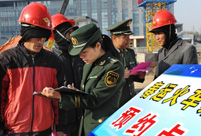 People prepare for upcoming 'Chunyun'
People prepare for upcoming 'Chunyun'  Highlights of Beijing int'l luxury show
Highlights of Beijing int'l luxury show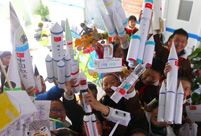 Record of Chinese expressions in 2013
Record of Chinese expressions in 2013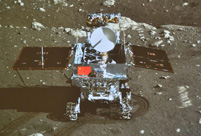 China's moon rover, lander photograph each other
China's moon rover, lander photograph each other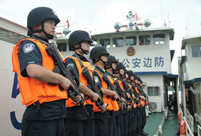 17th joint patrol of Mekong River to start
17th joint patrol of Mekong River to start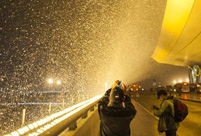 Spring City Kunming witnesses snowfall
Spring City Kunming witnesses snowfall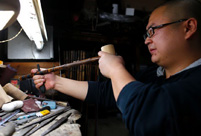 Heritage of Jinghu, arts of strings
Heritage of Jinghu, arts of strings Weekly Sports Photos
Weekly Sports Photos PLA elite units unveiled
PLA elite units unveiled  China's stealth fighters hold drill over plateau
China's stealth fighters hold drill over plateau Chinese navy hospital ship's mission
Chinese navy hospital ship's mission  "Free lunch" program initiated in NW China
"Free lunch" program initiated in NW China  Rime scenery in Mount Huangshan
Rime scenery in Mount Huangshan DPRK's Kaesong Industrial Complex
DPRK's Kaesong Industrial Complex 'Jin' named the word of the year
'Jin' named the word of the year Day|Week|Month